'Most of our friends use AI in schoolwork'
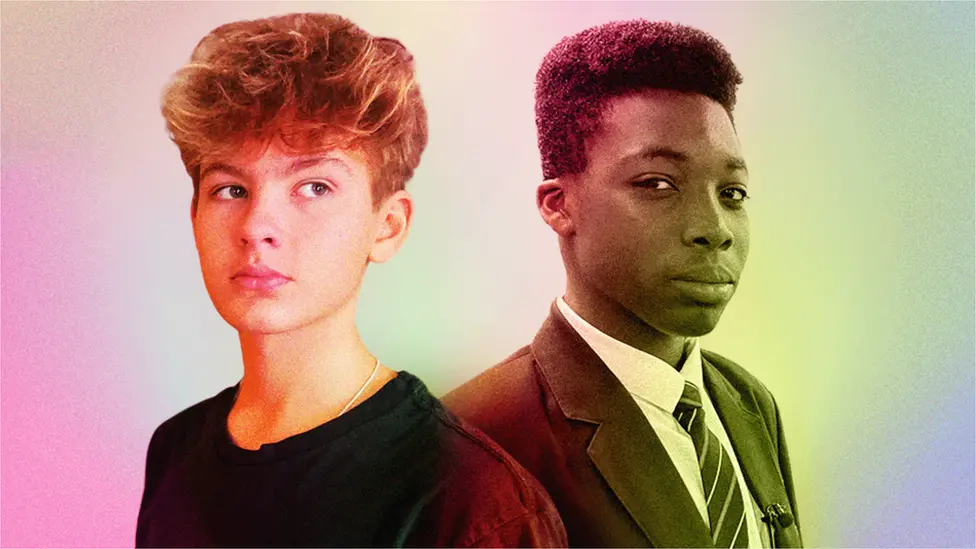 BBC
BBCAmid growing calls for schools to teach pupils about artificial intelligence (AI), BBC Young Reporters Theo and Ben have been looking at its risks and potential - and asked their classmates how they have used it to try to sharpen up their homework.

"A geography assignment was due next period and I used ChatGPT to write out the whole speech for me. When I was saying it out loud and I got asked questions I had no clue what I was saying. I got a detention."
"I didn't know what the question meant... so I put in ChatGPT and it just simplified it."
"When you're doing homework, there's no teacher in the classroom. It's like a teacher when you're at home."
That is just a snapshot of how some of our friends have tried to spruce up their schoolwork using AI - technology that allows a computer to act and respond almost as if it was a human.
We asked our form groups to fill out an anonymous survey. A total of 31 out of 33 had used AI in schoolwork, and 27 thought it should be taught in schools.
In interviews, most of our friends and classmates had used ChatGPT, an online tool that can answer questions in human-like language. They said it helped them come up with ideas, research, and things like structuring and phrasing.
Some, though, confessed to using it to cheat.
It did not always go to plan. One person said ChatGPT gave them the wrong dates for a history essay, and another said it got "90% of the answers wrong" in a physics assignment.
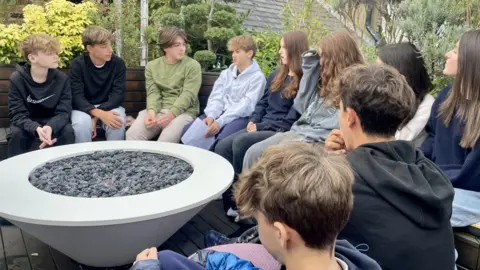
However, the idea that it was not fully trustworthy did not put off most people from using it.
"You can get a really structured answer from the likes of ChatGPT and then back that up with other extended research," one person said.
And, with AI being easily accessible 24 hours a day, there was some debate about whether it was better than a teacher.
"A teacher can have more of an understanding of you and they might have a personal connection, whereas AI doesn't really know anybody at all, it's just anonymous," one said.
'Incorrect answers'
Teachers themselves are exploring the potential of this rapidly developing technology, too. Jonathan Wharmby, who teaches computer science at Cardinal Heenan Catholic High School in Liverpool, uses AI to help with planning and creating resources, such as multiple choice questions - but said there were issues.
"Sometimes ChatGPT and the like will go off on tangents or will give incorrect answers, so it still needs me to look over them to check that they are correct," he said.
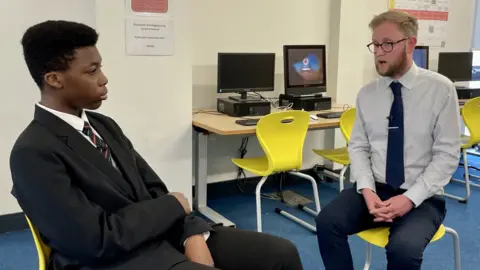
He said using ChatGPT in an exam scenario would be cheating, just as would using a search engine.
"But to help you with your schoolwork, I don't see an issue - as long as you've got that critical eye and you double check what it's coming back with," he added.
The government in England launched a consultation this year on AI in education, including on how it can be misused, and will publish its results later in the year.
Spot the difference
We wanted to see how easy it was to distinguish between work that was original, work that was fully generated by AI, and work that had - as Mr Wharmby suggested - used it as a tool.
So we set ourselves a challenge, which involved each of us answering the same essay question, twice.

Our first answers were entirely our own work. But for the second one we each used ChatGPT in a different way - one of us asking it to write the whole answer, and the other asking it to generate ideas and help plan the essay.
When we swapped to see if we could spot where the other person had used it, and how, we were both pretty confident that we could spot the difference.
But it turns out we should not have been - neither of us guessed entirely correctly.
One thing that threw us was how convincingly AI wrote about human emotions, like in this extract of the essay written entirely by ChatGPT:

The whole challenge made us realise just how deceptive AI can be and how easy it would be to cheat.
The risks of AI will be the focus of the first Global AI Safety Summit this week in Bletchley Park, which Prime Minister Rishi Sunak said would be attended by representatives from "companies pioneering AI and the countries most advanced in using it".
Mr Sunak said the world did not yet have "a shared understanding" of the risks, but that, ultimately, the UK would not "rush to regulate".
"We believe in innovation - it is a hallmark of the British economy, so we will always have a presumption to encourage it, not to stifle it," he said.

BBC Young Reporter is an exciting opportunity for young people to get involved with the BBC.
If you are 11-18 years old, then this is a chance for you to tell the stories that matter to you.
Click here to find out how to get involved.
Find BBC Teach advice about navigating news and media literacy lesson plans here.

BCS, the chartered institute for IT, which helps support the development of IT skills and knowledge in education, also believes in the potential of AI and wants all students to be taught about it from the age of 11.
Julia Adamson, its managing director for education, said pupils should be required to study at least one technology subject at GCSE.
"The world is digital now," she said.
"It's really important that we help young people to navigate that world - just in the way that we do when we hold their hand while we're walking along a busy street and we teach them the rules of the road and the risks."
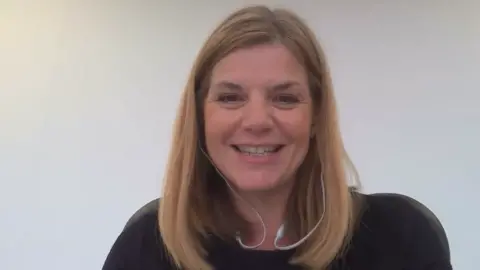
Ms Adamson said it would become easier for young people to cheat in schoolwork, but that did not mean they could not be trusted to create their own work. Instead, she believes young people should use it for things like structuring and generating ideas.
"The risk, of course, is that we become lazy, and we drop back in terms of our creativity and our critical thinking. And that's exactly the opposite of what we really need to do," she said.
While most of our friends had used AI in some way in school, a recent online survey for BBC Radio 5 Live and BBC Bitesize by polling company Survation suggests that may not be the case everywhere.
Just 29% of respondents said they had used AI technology for completing their homework or coursework.
'Out of place'
The Department for Education said the computer science GCSE is "designed to equip pupils with the knowledge they will need for the technological jobs of the future, including in AI".
Girls only make up about one in five entries in computing GCSE, according to government data.
Year 13 Student Ahana is the only girl in her sixth form studying computer science, and is campaigning to get more girls into the subject.
"I felt really overwhelmed and kind of even out of place at the beginning... I was quite afraid to speak up and speak my opinions," she told us over a video call.
"As time went on, I realised that this was not the case at all and I had as much right to be there as everyone else.
"This experience made me realise what a big problem that this really was."
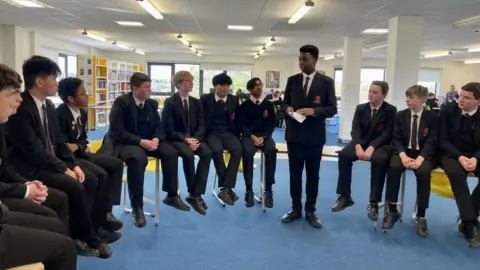
Last week, exam board Pearson Edexcel announced an AI qualification for students to study alongside A-levels.
After all of our work, we agree that our generation will be using AI in the future - and so young people should be taught about it.
We just have to make sure that the teaching includes its limitations, and that we do not over-rely on AI to generate ideas for us.
If you only execute ideas and you do not think of them, then you are losing a huge chunk of what is really important in the world.
As told to Hazel Shearing, BBC education correspondent
Additional reporting by Rahib Khan
